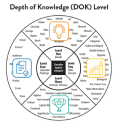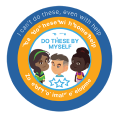At Penda, we take science learning and student engagement seriously. That’s why our digital science curriculum provides both without compromise. Our activities are hand-aligned to NGSS and state standards and delivered on a gamified platform that incorporate the motivational aspects of gaming to enhance the learning experience.
Gamification techniques, such as points, badges, and leaderboards, are seamlessly integrated into the experience to motivate and reward students for their progress.
From the student’s perspective, it’s all about mastering science content…to earn points! Each correct answer earns them activity and experience points, opening the door to Penda’s exciting gamification features. The student “Stat” section provides profile data, levels, challenges and achievements. The “Avatar Editor & Store” offers countless customization options to personalize their avatar and express themselves. Points, leaderboards, challenges, and avatars, all add up to making science even more fun.
Students’ first build their knowledge of scientific concepts with Penda’s activities. Then, abstract concepts are brought to life with interactive simulations. Students can not only visualize the concepts they’ve learned but are given the opportunity to form and test their own hypotheses, thereby deepening their knowledge.
In SpaceCRAFT, students are mistakenly transported to another world where they must work together to research their environment, analyze their choices, create tools to build a spacecraft to navigate back to Earth. SpaceCRAFT fosters collaboration, problem solving and critical thinking. Students can pool resources to work together with classmates on collective tasks, as well as complete individual challenges on their own. And don’t worry, teachers can set access times for all gamification elements.
Penda is 100% digital so students can learn at school, at home, or anywhere with an internet connection. When you have teacher vacancies, out-of-field teachers, and subs, Penda keeps science learning going by auto-assigning gamified activities that are standards-aligned AND custom aligned to your district’s science scope and sequence. As students work through activities, they receive immediate feedback and support to help them build their mastery without direct instruction.

Penda puts cutting-edge pedagogy front and center, employing Webb’s Depth of Knowledge (DOK) Levels to expand a student’s skill set. Penda’s rigorous activities have been shown to literally forge new neural pathways in the brain.The inquiry-based 5E Model (Engage, Explore, Explain, Elaborate, and Evaluate) is also employed to help students build a foundation for knowledge and deepen their understanding through active participation.

Penda uses Piaget’s concept of scaffolding by allowing a student to access prior knowledge up front, which then motivates the student to complete the activity and move on through higher levels of cognitive complexity. Activities are not timed, allowing students to move at their own pace and without anxiety. Scaffolding also ensures that students with learning challenges and language barriers have the same opportunities for success. Our scaffolding system also speaks to Vygotsky’s Zones of Proximal Development, offering students experiences and challenges that expand their emotional and intellectual reach to encourage new skill-building and growth.

Students learn best when they are engaged and in a state of “flow,” where challenge and skill are in equilibrium.When students choose, students learn: Penda activities ask students to make choices on the fly, which enhances learning and retention.

Teachers [said] Penda really made life easy, and I saw the results in my classroom –– that kids were able to show or re-learn something that maybe they didn’t get before.